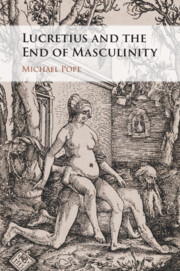Book contents
- Lucretius and the End of Masculinity
- Lucretius and the End of Masculinity
- Copyright page
- Contents
- Acknowledgments
- Abbreviations
- Chapter 1 Odd Men Out
- Chapter 2 Humbled Beginnings
- Chapter 3 Nature’s Assault upon the Senses
- Chapter 4 Death: The Hole That Gapes for All
- Chapter 5 The Ties That Bind
- Chapter 6 Vir Recreandus
- Bibliography
- Index
- Subject Index
Chapter 6 - Vir Recreandus
Published online by Cambridge University Press: 11 May 2023
- Lucretius and the End of Masculinity
- Lucretius and the End of Masculinity
- Copyright page
- Contents
- Acknowledgments
- Abbreviations
- Chapter 1 Odd Men Out
- Chapter 2 Humbled Beginnings
- Chapter 3 Nature’s Assault upon the Senses
- Chapter 4 Death: The Hole That Gapes for All
- Chapter 5 The Ties That Bind
- Chapter 6 Vir Recreandus
- Bibliography
- Index
- Subject Index
Summary
In the sixth and final chapter, we continue to trace how Lucretius rehabilitates Roman men and their performed gender. Although I resume exploring the sexual language and figures by which Lucretius depreciates male presumptions of anatomical and sociological advantage, in “Vir Recreandus” I also tease out from the poem a positive argument about masculinity. Following the poet’s cues, I construct what an Epicurean man is, what he can do, what he is for, and how he can flourish in Lucretius’ reordering of the world. This Epicurean homo turns out to be manly in behaviors that, in part, map onto traditional scripts for a vir even while acting and self-regarding in ways that Romans would deem strange indeed. Much to Cicero’s vexation, Epicurean men become Rome’s true patriots.
- Type
- Chapter
- Information
- Lucretius and the End of Masculinity , pp. 147 - 193Publisher: Cambridge University PressPrint publication year: 2023

